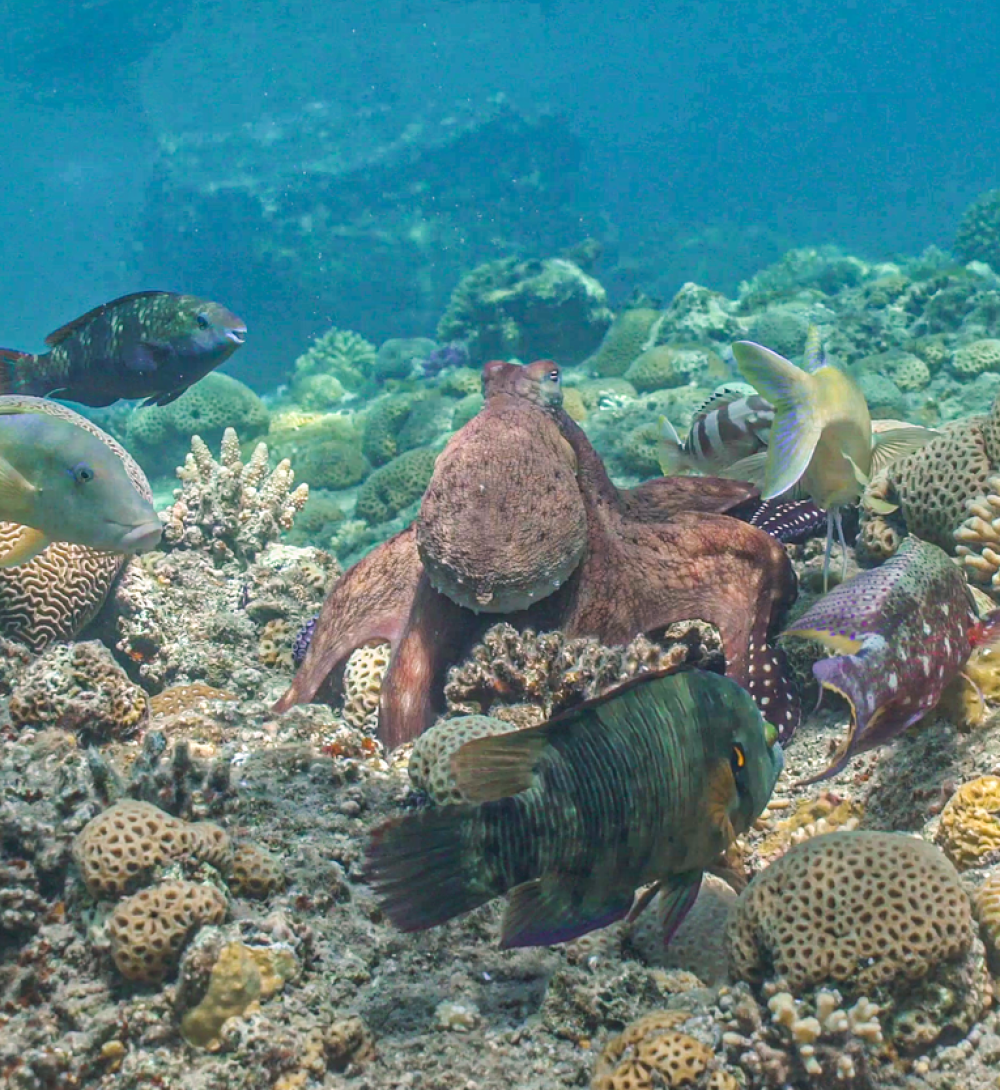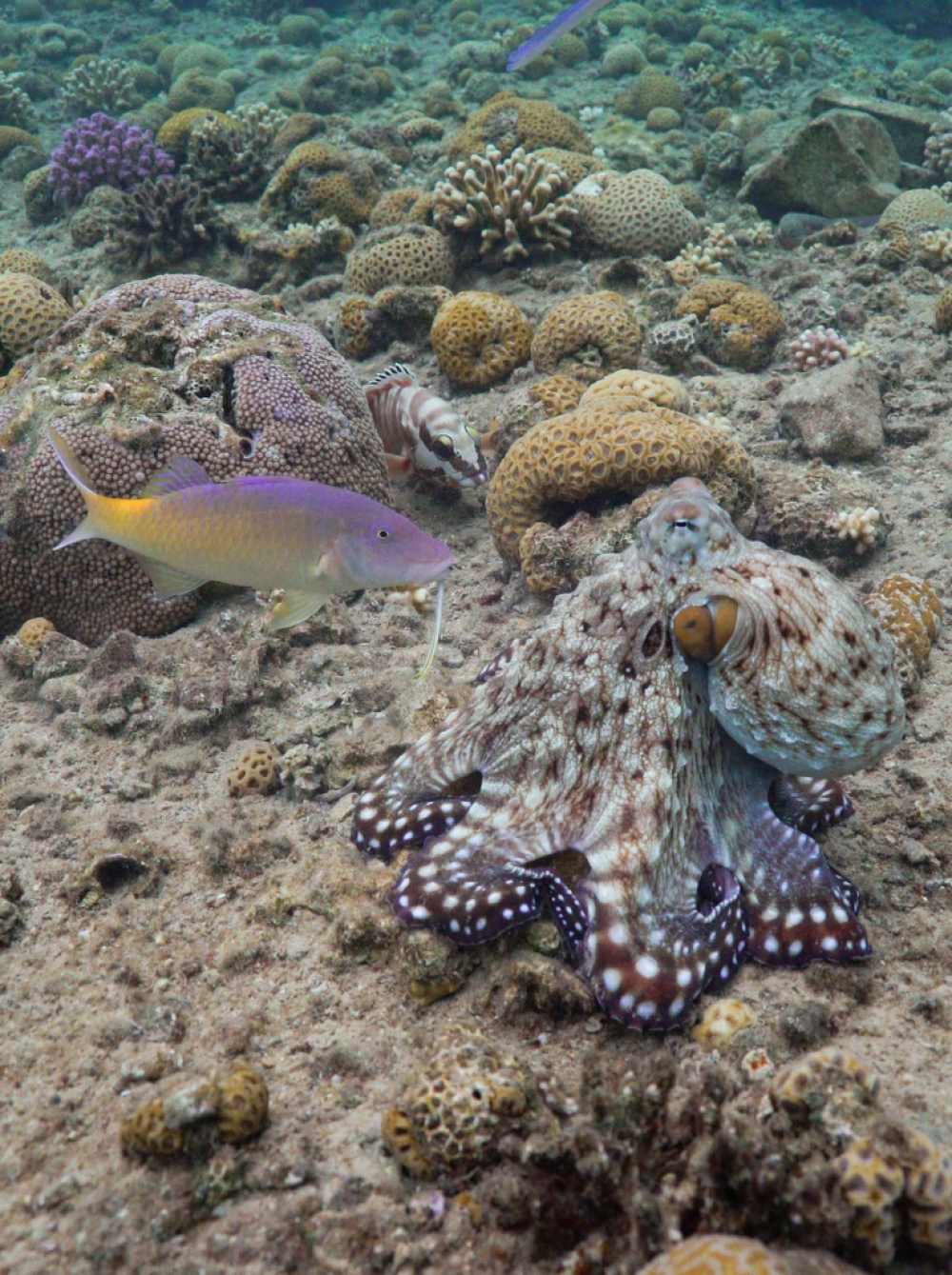Mixed-species hunting packs comprised of octopuses and fish have been observed working together in the wild to improve predation success. It’s been thought that the brainy octopuses would naturally lead the pack, but new research suggests that the chain of command may be more complicated than that.
Hunting with fish is a particularly curious behavior for the day octopus (Octopus cyanea), as these animals are typically solitary. However, that loner mentality seems to go out the window when it’s time to hunt, as they sometimes team up with a range of fish species including goatfish and groupers.
You quickly detect that something is going on when all these different species are sitting together, awkwardly looking in the same direction.
Dr Simon Gingins
To find out what the group dynamics are like in these hunting packs, a team of researchers went out on scuba diving expeditions in the Red Sea. Here, they were able to track 13 different groups amounting to over 120 hours of dive time data.
“Observing these hunts underwater was truly mesmerizing, so much was going on simultaneously and right before our eyes,” study co-author Dr Simon Gingins of the Max Planck Institute of Animal Behavior told IFLScience. “I felt really lucky to witness this.”
Video credit: Eduardo Sampaio
“Finding them was the trickiest part, since octopus tend to hide when they initially see us. But after a while, we developed a really good feel for it, and we usually spotted the fish first. If you know how these fish normally behave, you quickly detect that something is going on when all these different species are sitting together, awkwardly looking in the same direction. Usually, this means there is an octopus nearby.”
From analyzing their data, it appeared that different key decisions were being made by different group members. For example, when deciding where the hunting pack should go, the goatfish seemed to step up to the plate, specializing in environmental exploration. Meanwhile, octopuses were more likely to lead the group when it came to deciding if and when the group should move in on their prey.

“Observing these hunts underwater was truly mesmerizing.”
Image credit: Eduardo Sampaio and Simon Gingins
This kind of teamwork could be beneficial as the goatfish speed up the process of finding prey, while the octopus can noodle its way into any hiding places to catch it. It narrows down the available options more speedily, and could make it easier to identify the best options.
Working together had a good influence on hunting outcomes for the group members, by increasing the chance of success compared to when the respective species hunted alone. However, it wasn’t all teamwork and harmony between the octopuses and fish.
Octopuses are famously punchy, perhaps unsurprising given, well, *gestures at their entire body plan*. It seems they put their fisticuffs to good use when hunting alongside fish, as they were observed displacing some members of the pack by punching them.
Similarly, there was beef among the fish, as the team observed them displacing each other by darting towards one another. Whether the animals were cooperating or competing appeared to be influenced by the group makeup, and punching as a means of regaining control is a remarkable interspecies feedback mechanism for the day octopus, which is usually a solitary creature.

A day octopus hunting with a blue goatfish, while a blacktip grouper lies in wait.
Image credit: Eduardo Sampaio and Simon Gingins
Given octopuses are invertebrates, it’s an unexpectedly high level of flexibility for working with different species, and demonstrates how a system of “classical leadership” isn’t a good way to describe the complex interactions seen among interspecific hunting groups, in which leaders can adopt the roles of either stimulating or inhibiting movement.
So an efishient way to hunt, if you don’t mind the odd sucker-punch.
The study is published in the journal Nature Ecology & Evolution.
Source Link: Octopuses Form Hunting Packs With Fish, But Sometimes Sucker-Punch Their Comrades